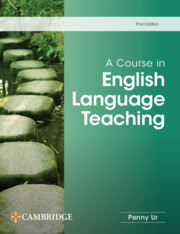Book contents
- Frontmatter
- Contents
- Acknowledgements
- Introduction
- 1 Teaching English today
- 2 The lesson
- 3 Classroom interaction
- 4 Tasks
- 5 Texts
- 6 Teaching vocabulary
- 7 Teaching grammar
- 8 Teaching listening
- 9 Teaching speaking
- 10 Teaching reading
- 11 Teaching writing
- 12 Feedback and error correction
- 13 Assessment and testing
- 14 The syllabus
- 15 Teaching/learning materials
- 16 Teaching content
- 17 Classroom discipline
- 18 Digital technology and online teaching
- 19 Learner differences 1: age
- 20 Learner differences 2: diversity and inclusion
- 21 Teacher development
- Glossary
- References
- Index
- Frontmatter
- Contents
- Acknowledgements
- Introduction
- 1 Teaching English today
- 2 The lesson
- 3 Classroom interaction
- 4 Tasks
- 5 Texts
- 6 Teaching vocabulary
- 7 Teaching grammar
- 8 Teaching listening
- 9 Teaching speaking
- 10 Teaching reading
- 11 Teaching writing
- 12 Feedback and error correction
- 13 Assessment and testing
- 14 The syllabus
- 15 Teaching/learning materials
- 16 Teaching content
- 17 Classroom discipline
- 18 Digital technology and online teaching
- 19 Learner differences 1: age
- 20 Learner differences 2: diversity and inclusion
- 21 Teacher development
- Glossary
- References
- Index
Summary
What is a text?
A text in the present context is a piece of writing or speech which is used for language learning. It can be studied as a complete and autonomous unit: the reader or listener can therefore understand it without necessarily knowing the context, even if it was originally an extract from a longer text such as a book, a website or a conversation. It is coherent, so it has a beginning, a middle and an end which make a clear sequence of thoughts or events, and belongs to a recognisable genre of speech or writing. The term as it is used here does not therefore normally include things like lists of words to be learnt, sentences that give samples of usage or a grammar exercise.
Usually, a coursebook text ranges in length from a paragraph to a page or two; or, if it is spoken, lasts for a couple of minutes. It may, however, be shorter; it could consist only of a brief poem, a proverb or a quotation (Maley, 1994, see Further reading). Texts outside the coursebook may be a good deal longer: several pages of a website, for example; or an entire book or audiobook. In any case, their function in a language course is to provide input which is a basis for language learning.
A distinction needs to be made between intensive and extensive text study. Intensive means that the text is not only understood, but also studied in detail, or milked for the language that can be learnt from it. It is also possibly analysed or used as a springboard for further language work, as described later in this chapter. Extensive means that the text is read or heard for pleasure and/or information, but not studied in detail: the main aim is to improve reading or listening fluency, and any language learning is incidental.
Most texts in English courses are used for intensive study, involving language learning in various ways: comprehension work; learning the language items which appear in it, analysis of content, genre or structure, and as a basis for further work on content or language.
In principle, it is possible to do intensive work on a listening text as well as a reading one, but in practice this is less common. A reading text is much easier to study, review and scan than a listening one, even with rewind and other digital facilities, and the availability of transcripts.
The guidelines in this chapter relate therefore mainly to texts used for intensive reading, though many of them can also be applied to spoken ones.
Information
- Type
- Chapter
- Information
- A Course in English Language Teaching , pp. 54 - 70Publisher: Cambridge University PressPrint publication year: 2024
